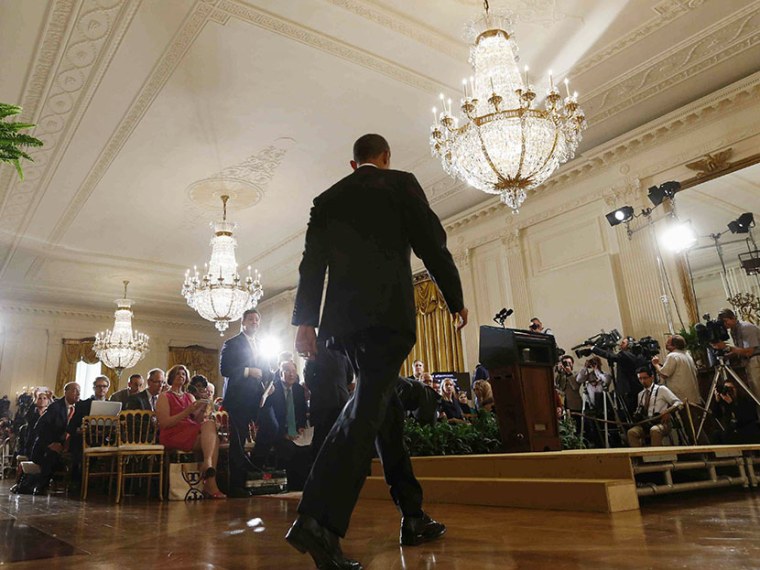Two months after Edward Snowden leaked secret documents to the Washington Post and The Guardian showing the extent of government surveillance in the name of national security, President Barack Obama has signaled he is open to major changes in how the surveillance programs operate.
"Given the history of abuse by governments, it's right to ask questions about surveillance," Obama said at a press conference Friday afternoon. "It's not enough for me as president to have confidence in these programs, the American people need to have confidence in them as well."
At the heart of Obama's plan is what he described as "appropriate" reforms to section 215 of the Patriot Act. He said he would support the addition of a public advocate who would argue against the government's surveillance requests made to the secret foreign intelligence surveillance court.
The first of Snowden's leaks was secret order from the FISA court that accepted an NSA request for all the communications data of customers from a Verizon subsidiary. The order was justified under section 215 of the Patriot Act, which allows the government to collect business records considered "relevant" to a business investigation. Obama's critics in Congress, including supporters of the Patriot Act, have said the use of section 215 to collect Americans' data without evidence of links to terrorism went beyond what the law was meant to authorize.
The administration released a white paper during the president's press conference that shed further light on how section 215 came to be used to authorized bulk collection of Americans' communications data. "Multiple FISC judges have found that Section 215 authorizes the collection of telephony metadata in bulk," the white paper reads. "Moreover, information concerning the use of Section 215 to collect telephony metadata in bulk was made available to all Members of Congress, and Congress reauthorized Section 215 without change after this information was provided."
Both the rulings made by the FISA court and the reports made to Congress were secret, however, so the American people never saw them. Notably absent from Obama's reform proposals was declassifying the secret court opinions that reach key legal conclusions about national security laws, something legislators have repeatedly called for.
Obama said that his decision to release more information about the surveillance programs and to work with Congress at altering the laws authorizing government surveillance was in part the result of recent meetings with critics of NSA surveillance. Legislators who previously attempted to curtail surveillance authorities based on what they were being told in private were stymied by their colleagues, sometimes at the urging of the Obama administration itself. In late July however, the Republican controlled House came within a few votes of banning bulk collection of data under section 215, indicating that the politics of surveillance had changed since the Patriot Act was first passed.
Whether Obama would accept the changes Congress wants to make, or whether Congress would be satisfied with what the White House deems "appropriate" changes to the Patriot Act remains an open question that will have to be hammered out after the August recess. Following the press conference, Colorado Democratic Senator Mark Udall, a prominent civil libertarian critic of the administration, said in a statement saying that "This is an important first step—but I will keep fighting to ensure it's not the administration's last in this direction."
Obama acknowledged during the press conference that "there's no doubt that Mr. Snowden's leaks triggered a much more rapid, passionate response" than would have been the case otherwise. But he insisted the debate over government surveillance could have occurred without the leaks. Obama also said that members of the intelligence community "who have lawfully raised their voices on behalf of privacy and civil liberties are also patriots who love our country and want it to live up to our highest ideals." He notably excluded Snowden, whose leaks precipitated the debate Obama now says is "right to have," from that category.
